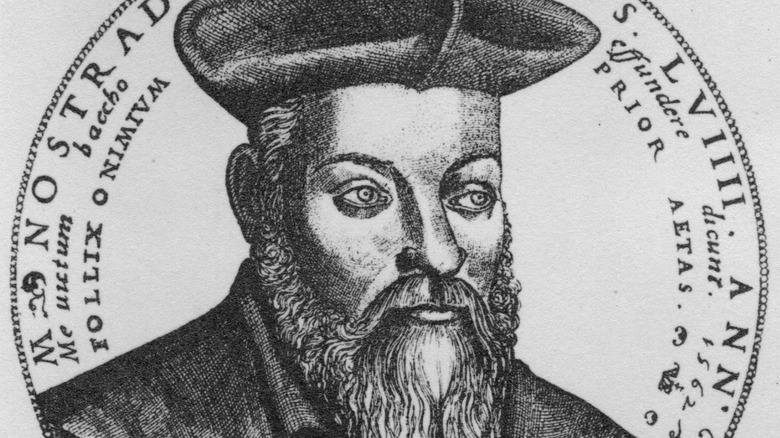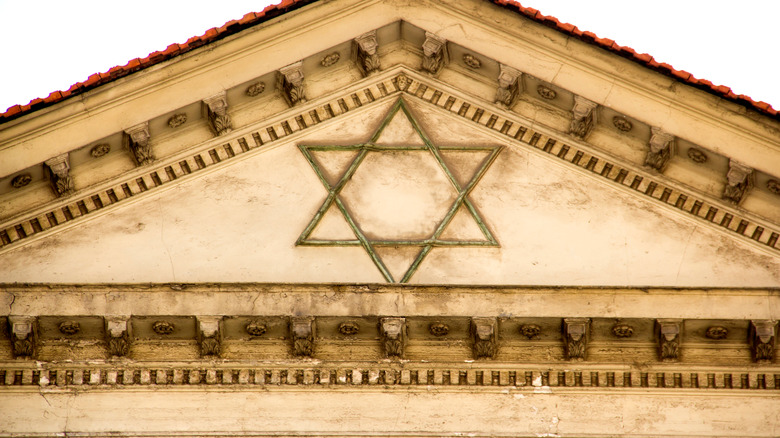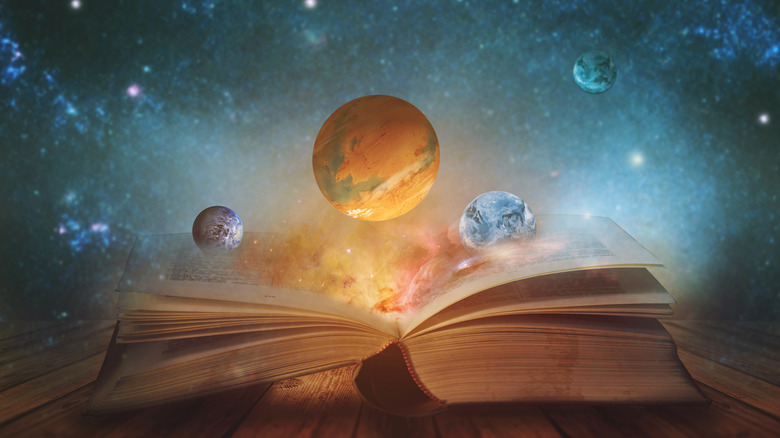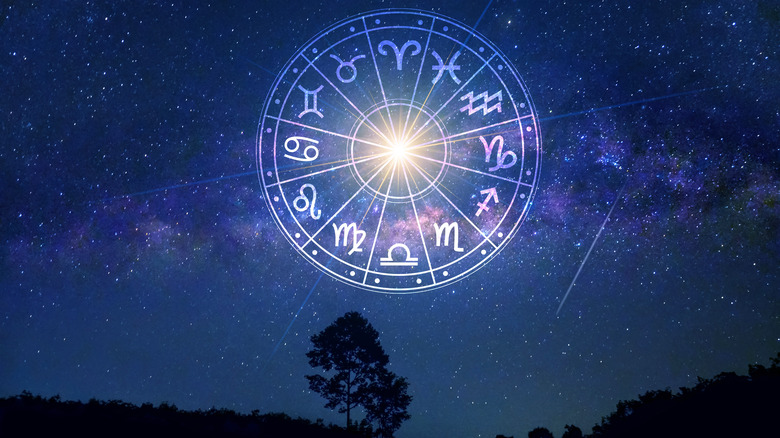How Nostradamus' Judaism Helped Shape His Science
"The ancient work shall be fulfilled in time / The roof shall come crashing down on the lord / An innocent blamed for the mortal crime / The culprit hiding in the misty grove."
Judging by these lines alone, French doctor, occultist, and prophesier Michel de Nostredame, aka Nostradamus, wasn't too big on specifics. There's just enough semantic cohesion, poetic pizzazz, and allusive imagery to steer the minds of believers in whatever direction suits the horrible circumstances of the moment. And make no mistake, there's always some horrible circumstance of the moment. As of the time of this writing, for instance, COVID-19 has claimed 6.3 million lives (via Worldometer). Meanwhile, the valiant few of Ukraine continue to stave off a Russian invasion. Those alone provide Nostradamus with plenty of material.
But Nostradamus didn't start off as history's most legendary doomsayer. Long before he wrote his landmark 1555 work "The Prophecies," a book composed of 942 quatrains (four-line poems) prophesying the future (via The Saturday Evening Post), he was a medical doctor. And by all accounts, he was a pretty darn good one. During an outbreak of bubonic plague, he prescribed the very common-sense regiment of "fresh, unpolluted air and water and clean bedding," for instance, as the Jewish Virtual Library says. While this may not sound revolutionary, he apparently saved thousands of lives.
History, however, has often overlooked a critical facet of Nostradamus' upbringing, both in a cultural and mystical sense. Nostradamus, it turns out, was Jewish.
A secret Jewish lineage
As it turns out, Nostradamus was born Jewish in 1503 and raised in a Jewish family, as the Jewish Virtual Library explains. He was also a Frenchman born in a little town called St. Remy during the reign of King Louis XII from 1462 to 1515, a ruler remembered largely for being incompetent and despised, as Britannica outlines.
We have Louis XII to thank for squelching Nostradamus' Judaism. In 1501, he ordered all Jews expelled from Provence, a region in southeast France bordering the Mediterranean Ocean. As the Jewish Virtual Library says, any Jew who remained had to be baptized — converted to Catholicism, essentially. When Louis XII discovered that his tax money in Provence had gone down because so many Jews had left, he went one jerk move further and introduced a special tax on all remaining. Nostradamus' family was among these individuals, as they were wealthy enough to afford the tax.
Nostradamus' grandfathers were both physicians. They guided their grandson in his childhood studies of Hebrew, Greek, and Latin and were also responsible for teaching him more esoteric elements of Judaism like Kabbalah and alchemy, which he learned in secret. This tutelage, when combined with Nostradamus' own interest in astrology and mathematics, fostered his lifelong curiosity regarding mysticism and prophecy.
The arcane wisdom of Kabbalah
To understand Nostradamus better and see how Jewish mysticism influenced his work and life, we have to take a little detour into Kabbalah. Kabbalah is an ancient, esoteric school of thought within Judaism that sounds nothing like what we, in the modern day, relate to images of Torah readings, Passover meals, and Hasidic Jews hanging out in Williamsburg, Brooklyn. It's got much more to do with cosmic visions, arcane texts, and the hidden secrets of the universe, as the Jewish Virtual Library explains. In other words, it's exactly what Nostradamus latched onto.
Kabbalah in its modern form can be traced back to a book called the Zohar, written by Spanish Rabbi Moses de Leon. Or, if you're a believer, the book "was revealed" to Leon during the 1270s, as the Jewish Virtual Library describes. Essentially, Leon did for Kabbalah what people like Icelandic poet Snorri Sturluson did for Norse myth: he compiled decentralized sets of lore into one coherent tome. This helped preserve Kabbalistic traditions and pass them along to the present.
In its tamest form, Kabbalah is rooted in interpreting the Talmud, a book of Jewish law from the 2nd century, as the BBC describes. In its more transcendental form, as New Kabbalah relates, Kabbalah is about awakening the true "inner divine self" that reflects the cosmic essence we call "God" like a mirror image. Human egos are "celestial counterparts" to the eternal and forever seek reunion with the "infinite divine principle."
Medicine with a mystical twist
Nostradamus entered the University of Montpelier in 1522 to become a medical doctor just like his grandfathers, as History explains. However, his interest in very non-Catholic things like Kabbalah and astrology didn't settle too well with the priests who oversaw his education. On top of this, Nostradamus had previously worked as an apothecary dispensing medicine, a "manual trade" considered low enough for the university to expel their young, against-the-grain student. Nonetheless, it seems like Nostradamus managed to graduate and get his medical license by 1525.
For the following 12 years, Nostradamus more or less kept his nose clean while practicing medicine in the countryside during outbreaks of bubonic plague. While there's no telling how his interest in Kabbalah, astrology, the occult, etc., grew during this time, his unique way of thinking remained visible. For instance, he went out at dawn every morning to harvest rose petals and crush them into powder to make pills. He then gave those pills to patients and told them to keep them under their tongues throughout the day, as the Jewish Virtual Library says. He was also a big proponent of cleanliness and told patients they needed clean water, clean air, and clean bedding.
In 1537, however, Nostradamus' life fell to ruins. His own family caught the plague and died. This wound up killing his career, too, as the public no longer believed in his methods. But it was this tragedy that opened the door wide for Nostradamus' mysticism.
The prophetic tree of Kabbalistic roots
At this point in his life, Nostradamus starts to look more like the Nostradamus we popularly envision. After his family and career died in 1537, he made some "offhanded remark" about a church statue in 1538, and that's all it took for the Inquisition to hunt him down. He took to the road and wandered throughout Europe to stay alive, passing through Italy, Greece, Turkey, and more, as History explains. Whether by psychological necessity, boredom, or sheer desperation, this period of time gave Nostradamus the chance to let his arcane, Kabbalistic roots grow and blossom.
After a full decade in the wilderness, so to speak, Nostradamus returned to civilization. In 1547, he went back to his hometown, remarried, had some kids, and published a couple of books related to medical science. One of them, "Traité des Fardements" — a kind of homeopathic cookbook for plague treatment — harkened back to his apothecary days and also alluded to the kinds of "rose petal pill" treatments that had damaged his reputation.
During this time, Nostradamus went one step further with the whole naturalism-homeopathy-plant medicine thing, but in a trippy, Ayahuasca "reveal the secrets of the universe" kind of way. In keeping true to the more transcendental aspects of Jewish Kabbalah, he tried his hand at visions quests and meditation using bowls of water and herbs. In 1550, he published his first book of predictions, a folklorish almanac that merchants and farmers could reference during the year.
An apocalyptic legacy
As soon as Nostradamus published his legendary 1555 book "The Prophecies," he became a kind of occult celebrity. As the Jewish Virtual Library tells us, Queen Catherine de Medici herself — wife of King Henry II, who ruled France from 1547 until 1559 — absolutely loved him. The aristocracy followed her lead and started going to Nostradamus for astrological predictions. In 1556, as History says, he was appointed Counselor and Physician-in-Ordinary to King Henry's court in a kind of dual role as mystical soothsayer and licensed physician.
And the church? They just left Nostradamus alone, it's believed, largely because he didn't delve too far into what could ostensibly be classified as "magic." Plus, he had the favor of the court to protect him. And so — irony of ironies — Nostradamus had come full circle back to enjoy more notoriety than ever, at the place of his birth, by diving into the very Jewish heritage and arcane practices that had been squelched when he was a kid and which later led to his ostracization.
Nostradamus, though, remained afraid of political and religious persecution. This is why he decided to obscure his prophetic visions in their four-line-poem format that lends "The Prophecies" its ambiguity. Because of this choice, modern-day folks still wonder if Nostradamus' "fire and a long trail of sparks" refers to the latest meteor on its way to obliterate Earth (as 7 News cites). But without Nostradamus' Judaism, we likely wouldn't have any such prophecies at all.





